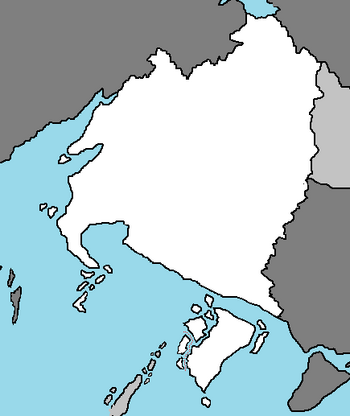Zoygaria
This article is incomplete because it is pending further input from participants, or it is a work-in-progress by one author. Please comment on this article's talk page to share your input, comments and questions. Note: To contribute to this article, you may need to seek help from the author(s) of this page. |
The Imperial Commonwealth of Zoygaria Sodružéstvo Imperiál de Zoyívska | |
|---|---|
| Motto: "Gens una, unus populus" | |
| Anthem: La Marszą de la Korona | |
 | |
| Capital | Vostok |
| Largest city | Akuí |
| Official languages | Zoygarian |
| Recognised national languages | Czaszar, Shilagino |
| Ethnic groups (2014) | Zoygarian, Shilagino |
| Demonym(s) | Zoygarian |
| Government | Semi-Constitutional Monarchy |
• King | Arristok Zobieski III |
• Prime Minister | Sajto Solski |
| Legislature | La Praetoria |
| Skolja | |
| Šečo | |
| Population | |
• 2014 estimate | 57.8 million |
| Currency | Pavau |
| Time zone | |
| Date format | dd-mm-yyyy |
| Driving side | right |
| Calling code | +909 |
| Internet TLD | .zy |
Zoygaria, officially the Imperial Commonwealth of Zoygaria (Zoygarian: Sodružéstvo Imperiál de Zoyívska), is a Semi-Constitutional Monarchy located in Eastern Nortua in the Coalition of Crown Albatross. It is bordered by Trive to the west, Versenia and Greland to the east, and shares a maritime borders with Jumbosa, Oeslia, Jyau, and Vitosium to the south. Zoygaria is characterized by hilly, highly-varied elevation and terrain, dominated by low-lying mountains and hills, particularly in the southwest. The country is covered in vast expanses of plains and steppes with a broad coastline into the Nortua Sea and hundreds of islands, the largest of which is the island of Povoska. The Zoygarian climate is typically cool and mild in the summer months with biting winters that scourge the countryside in the latter half of the year. The Zoygarian capital is Vostok, the 4th-largest city, the largest being the historical city of Akuí, the metropolitan and cultural heart of the Imperial Commonwealth. Zoygaria has a population of approximately 57,801,000, making it the third-most populous nation in Nortua.
History
Geography
Climate
Environment
Politics and government
Military
The Armed Forces of Zoygaria (Zoygarian: Las Forças Armatas de Zoyívska) or FAZ consist of four primary branches and one unincorporated branch: the Zoygarian Army (Zoygarian: La Tierra Vojna), Navy (Zoygarian: La Mara Vojna), Air Force (Zoygarian: La Astra Vojna), Elite Guard (Zoygarian: La Guardia de Élite), and the Royal Guard (Zoygarian: La Guardia Krolovski). The Commander-in-Chief of the FAZ is the ruling sovereign of the Imperial Commonwealth (currently King Arristok Zobieski III of Zoygaria), to whom all personnel must swear allegiance to in addition to the Imperial Commonwealth, with secondary power being afforded to the Secretary of Defence. The FAZ is tasked with maintaining the territorial integrity of the Imperial Commonwealth and her allies, maintaining security within the borders of the Imperial Commonwealth, and protecting the Imperial Commonwealth's interests abroad.
According to a 2021 report, all four primary branches were recorded to have a sum of 605,000 active-duty personnel, with the Reserves and Royal Guard increasing this number to 885,000 total personnel. The Imperial Commonwealth does have conscription laws in place, though conscripted personnel are relegated to the Reserves unless a state of war is entered, in which case a portion of the Reserves are transferred to active-duty. Zoygaria has a long history of military prowess with a particular focus on sea and air, and to this day maintains a large navy and air force, possessing 3 aircraft carriers, 1 of which is the experimental nuclear aircraft carrier Pustulka II. The Zoygarian military is almost entirely self-manufactured, primarily by companies such as Sukhoi, Mikojan i Gurevič, and the United Shipbuilding Corporation. Zoygaria's defence policy has oft mirrored its foreign policy, being deployed in the service of allies in need or wherever Zoygaria feels will best safeguard its interests. Zoygaria has its own nuclear weapons payload, developed in 1979 under Project Švitkadita.
La Tierra Vojna
La Mara Vojna
La Astra Vojna
La Guardia de Élite
La Guardia Krolovski
Foreign relations
Economy
Energy
Industry
Infrastructure
Transport
Demographics
Education
Religion
Culture
Music and art
Cuisine
Sports
Navigation menu
